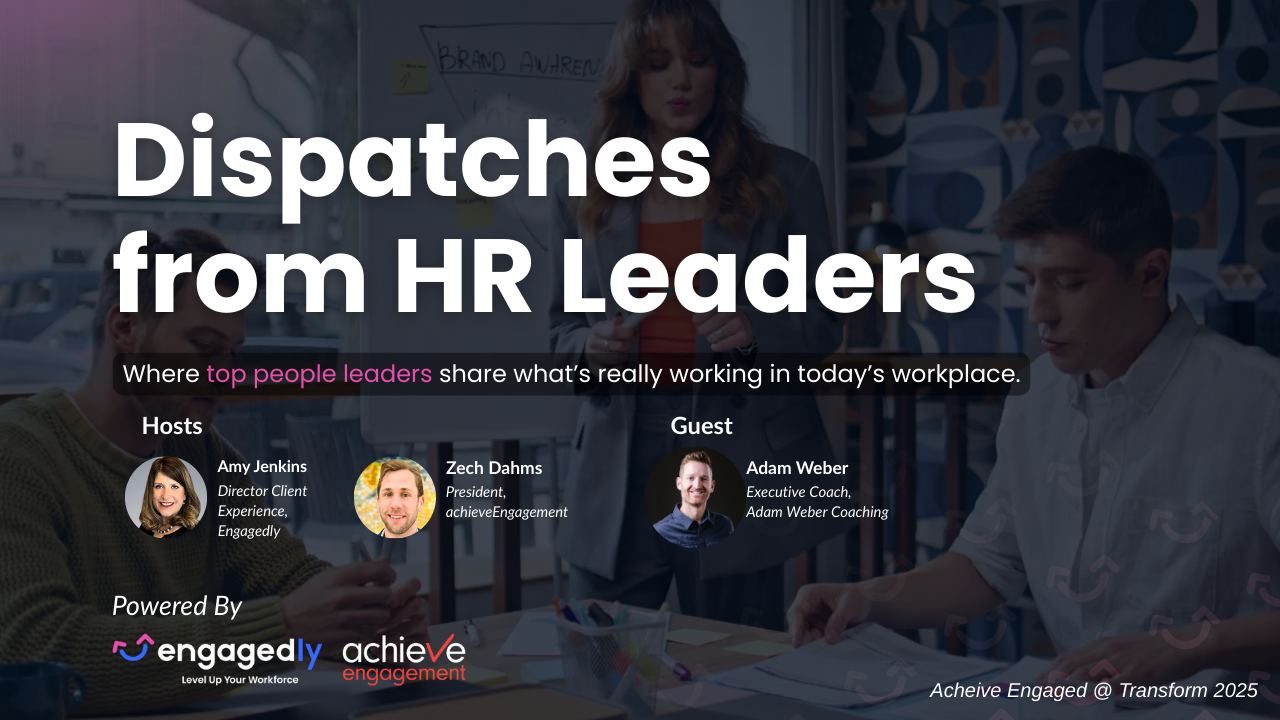At Transform’s People, Culture, and the Future of Work series, executive coach and former Chief People Officer Adam Weber shared his front-row insights into the challenges—and opportunities—facing today’s founders and people leaders. With experience leading two startups to successful exits and guiding executives through high-pressure roles, Weber offered a candid look at what it takes to thrive in the modern workplace.
Key Takeaways — Adam Weber at Transform
- Founders: Ditch the “spend big” era — run lean, align fast, and keep your magic without creating chaos.
- CPOs: Stop playing small — own the table, fix misalignments, reinvent roles, and use AI to future-proof talent.
- Performance: Busy ≠ productive — clarity, focus, and feedback win every time.
- Managers: Train them before you burn them out.
- Future Shock: Deepfake job interviews are coming… sooner than you think.
Founders: The Shift from Abundance to Precision
Five years ago, many startups operated in a climate of abundant capital. That’s no longer the case. Founders today are being forced to adopt a leaner mindset—tight control of spending, maximizing the output of every team member, and fostering rapid alignment across functions.
But the pressure isn’t just financial. The weight of constant decision-making can be crushing. Weber draws a sharp contrast between two types of founders:
- The Chaotic Visionary, full of new ideas but prone to derailing strategic plans with every fresh inspiration.
- The Steady Driver, who channels vision through clear priorities and consistency, inspiring teams without creating “strategy whiplash.”
The key? Help visionary leaders prioritize without extinguishing the creative spark that makes them exceptional.
Chief People Officers: From HR Leaders to Strategic Powerhouses
The role of the Chief People Officer (CPO) is evolving rapidly—from a support function to one of the most strategically important seats at the executive table. Weber’s challenge to CPOs is bold: become the most important leader in the company after the CEO.
To do that, CPOs must:
- Expand influence beyond HR into cross-departmental strategy.
- Spot and resolve misalignments between teams early.
- Redesign roles for the future of work, whether that means eliminating outdated positions, upskilling current employees, or integrating AI-powered agents.
- Lead assertively, with conviction in both people-first and performance-first strategies.
Yet many hesitate. Weber believes this stems from “internalized rejection” and the absence of a well-worn path for forward-leaning people leaders. Unlike CFOs—whose role has been clearly defined for decades—CPOs are navigating uncharted territory, often encountering territorial resistance from other executives.
Rethinking Performance: Beyond “Frustrated Frank” Leadership
As companies refocus on performance, Weber warns against a return to outdated management styles—what he calls the “Frustrated Frank” approach: leaders judging productivity by how busy or stressed people appear.
True high performance, he says, comes from:
- Radical alignment at every level of the organization.
- Clear expectations tied to the company’s most important initiatives.
- Consistent feedback—both positive and corrective.
- Balancing high care with high expectations.
Employees shouldn’t just know their daily tasks—they should understand how their work drives broader business goals.
The Mid-Level Manager Crisis
Data from Weber’s former employee engagement company revealed a persistent issue: high-performing individual contributors promoted to management without training. Lacking leadership skills, they revert to doing the work themselves, get burned out, frustrate their teams, and eventually leave—only for the cycle to repeat.
Breaking this pattern requires investment in management training as a core business priority, not an afterthought.
A Bold Prediction: Deepfake Job Interviews
Weber’s most unexpected “future of work” warning? Deepfake interviews. He believes companies are vastly underestimating how soon this will become a major problem. As video-based hiring grows, the potential for candidates to use AI-generated personas in interviews is no longer science fiction—it’s already happening in isolated cases.
With few vendors or training programs addressing the issue, Weber urges HR tech leaders to start preparing now.
Final Thought
Whether you’re a founder wrestling with resource constraints or a CPO navigating new strategic responsibilities, Weber’s advice boils down to this: lead with clarity, act with conviction, and don’t confuse busyness with performance. The future of work will favor those who can balance innovation with discipline—and humanity with high standards.

